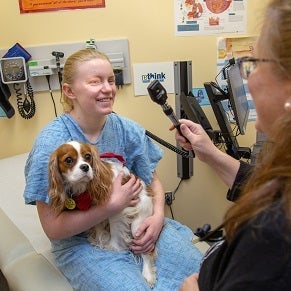Sully Joins the School-Based Health Center Team at Unadilla Valley Central School
January 21, 2020Categories: Bassett News
Sully, a three-year old Cavalier King Charles Spaniel, has joined the school-based health center team at Unadilla Valley Central School.
“I purchased Sully specifically with pet therapy in mind,” explains his owner and school-based health nurse practitioner Susan Converse. “I have another King Charles and know that this breed’s even temperament makes them perfect for pet therapy.”

Converse, who is also a trained psychiatric nurse practitioner, joined Bassett a year and a half ago. Prior to that, she worked at Golisano Children’s Hospital, where pet therapy is used extensively.
“Children who have been through a traumatic experience, are agitated, anxious or depressed will often open up and share their feelings much more readily when there is a therapy dog with them,” says Converse.
In fact, there have been numerous studies that show the clear benefits of animal-facilitated therapy, which include stress reduction and a calming presence that can lower blood pressure.
“Dogs are non-judgmental. They don’t see color or social status, and Sully’s breed is particularly adaptable, sociable and affectionate,” says Converse. “He is a welcome distraction for young children who come to school-based health for their immunizations. The school has had children with special needs spend time with Sully and sometimes, a child has had something happen at home. Maybe a grandparent died, and I’ll get a call asking if the student can come be with Sully.”
Not just any canine can become a therapy dog. There is required training and testing, along with strict health requirements. To become a therapy dog, Sully also had to pass the American Kennel Club’s good citizen test, which he did last year.
